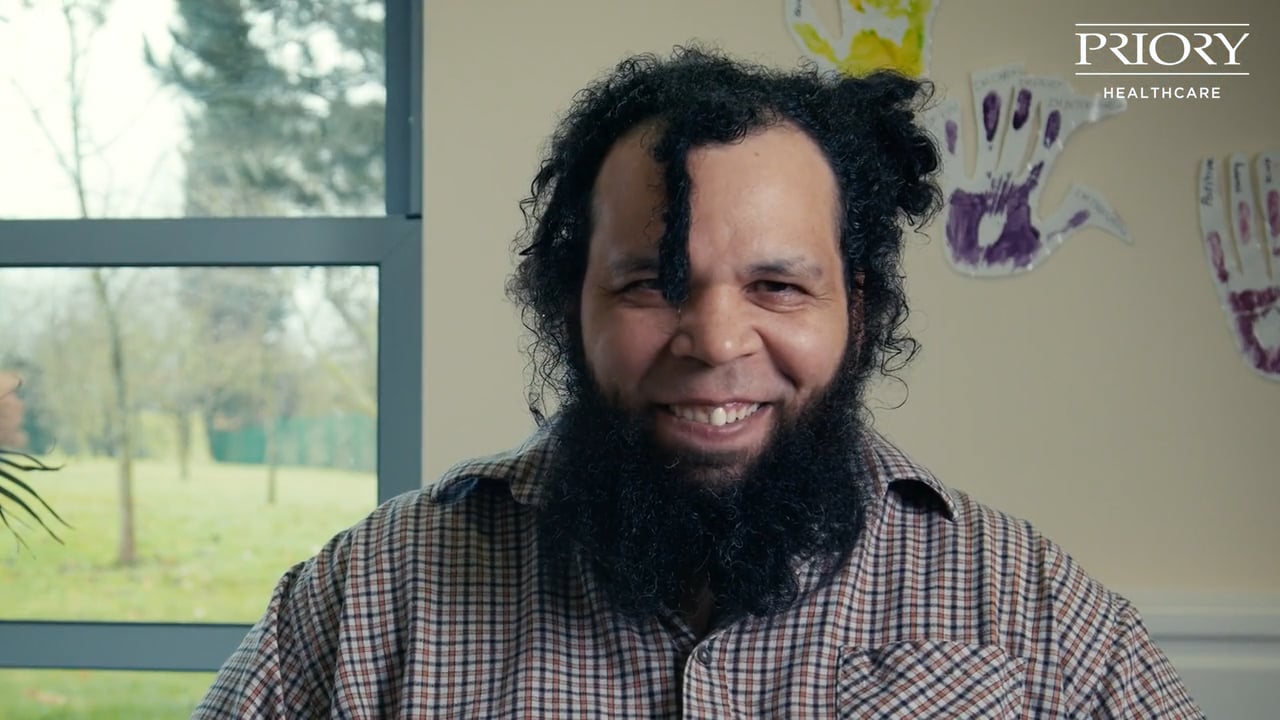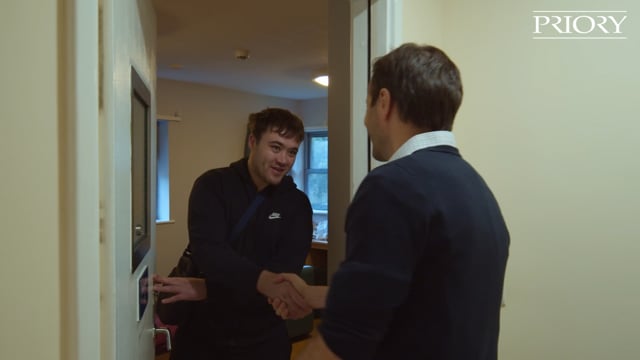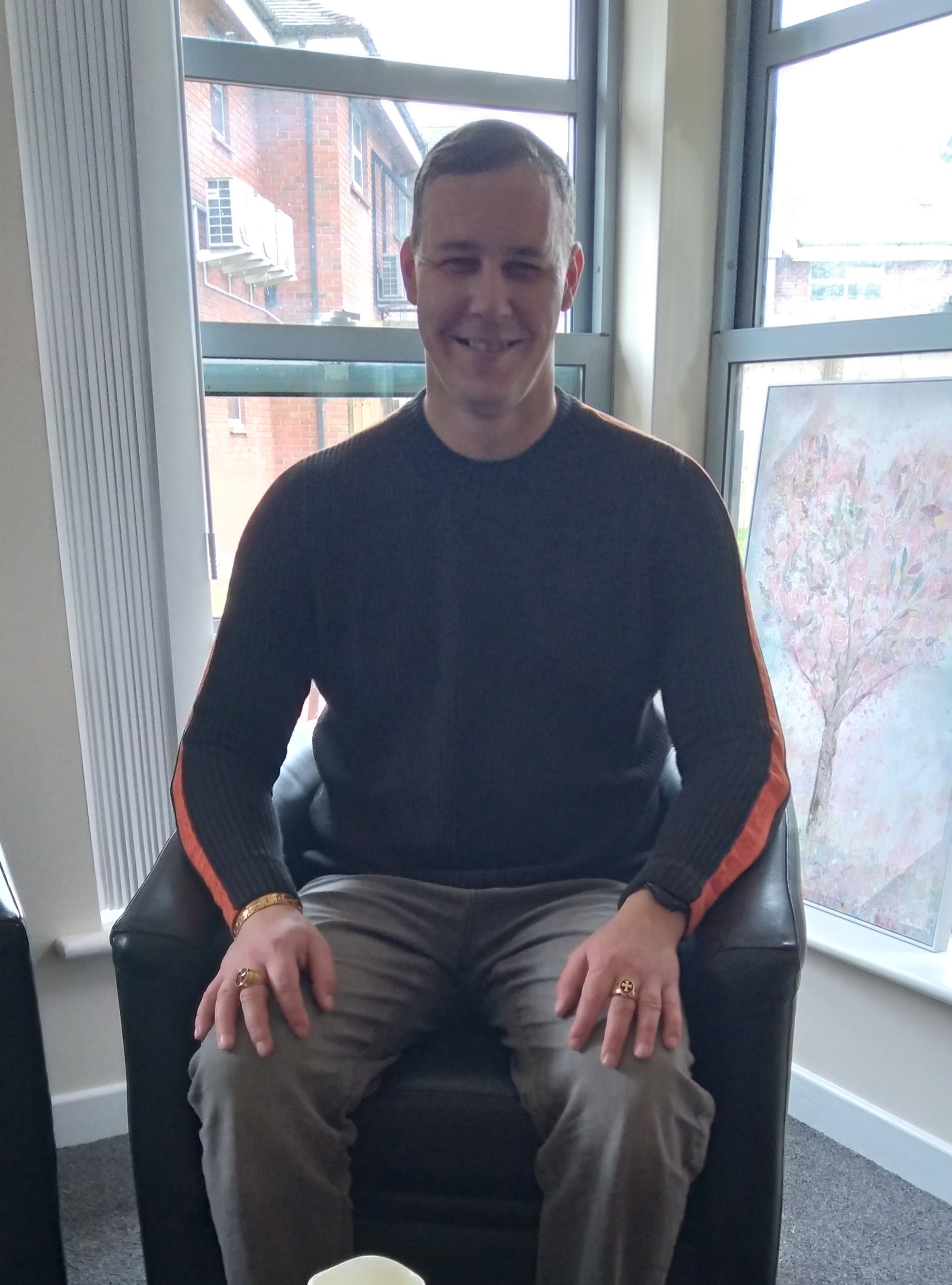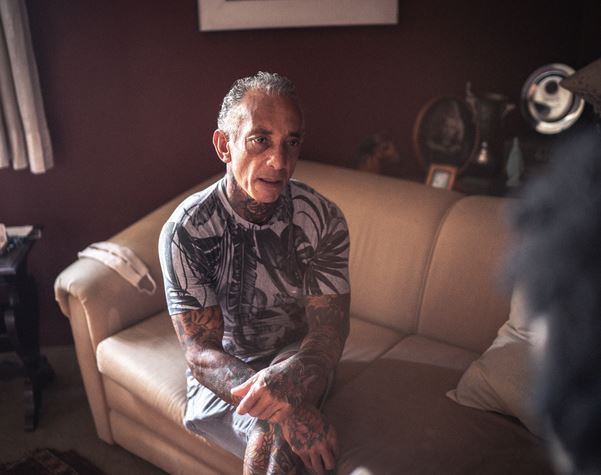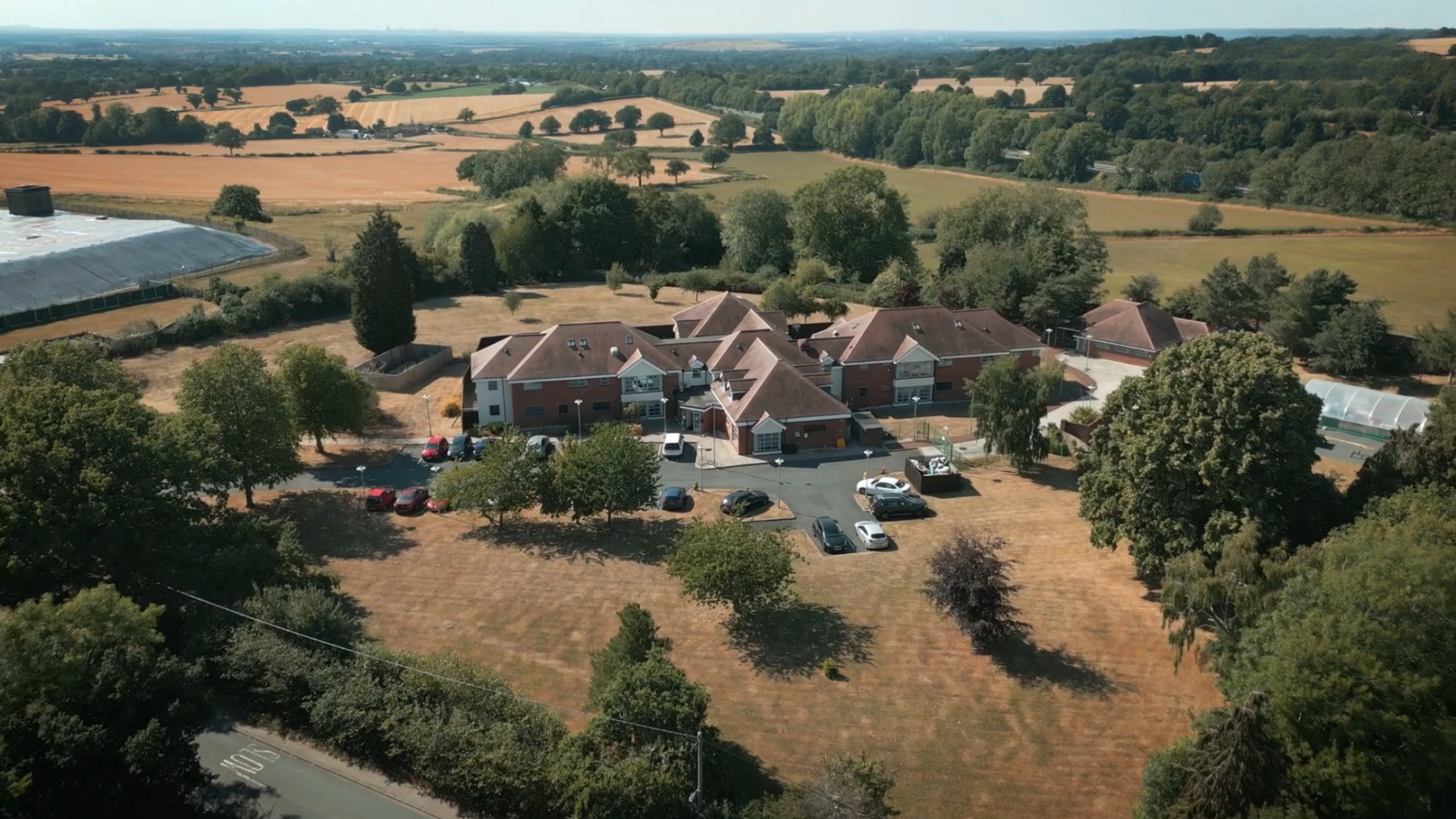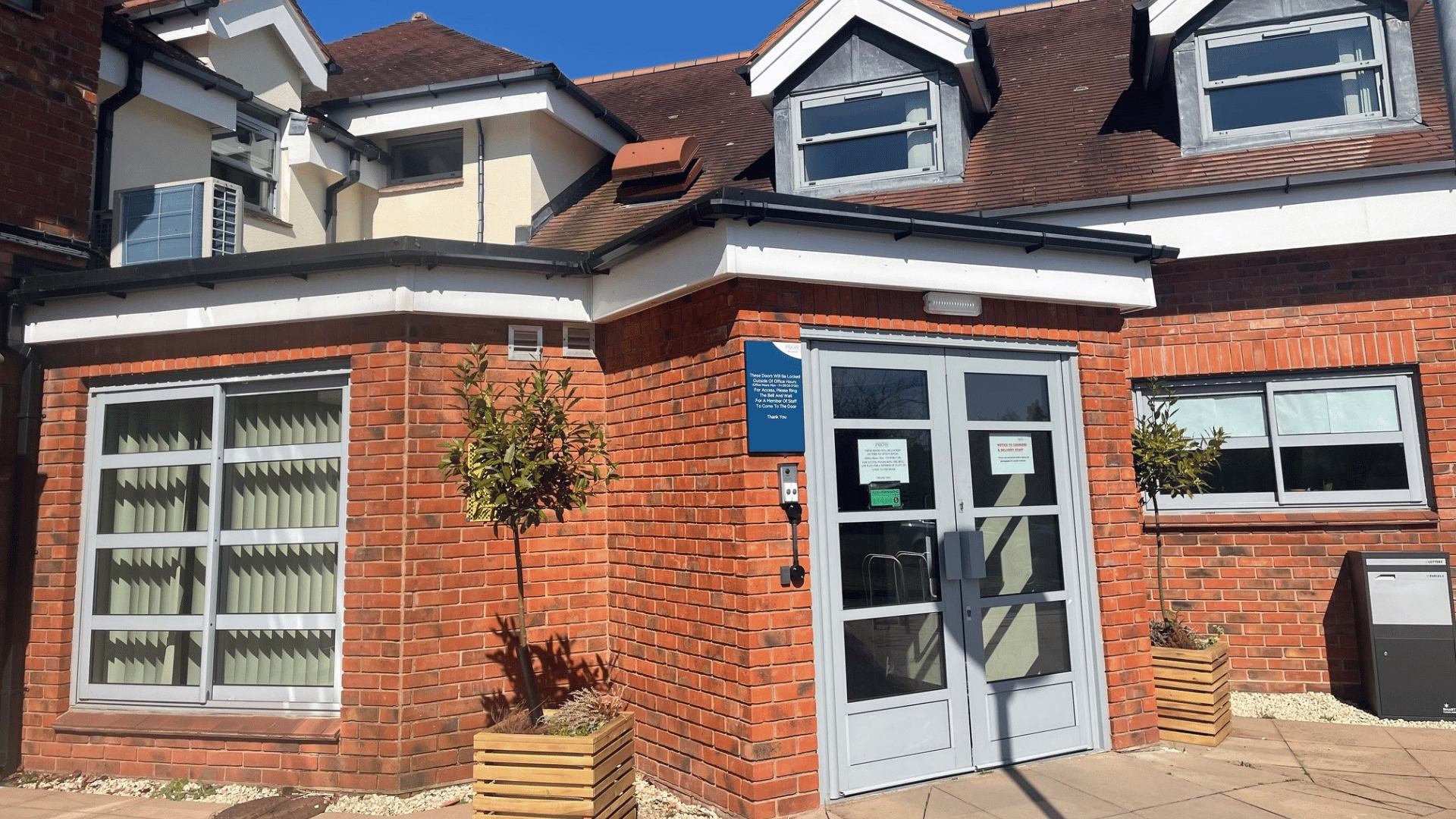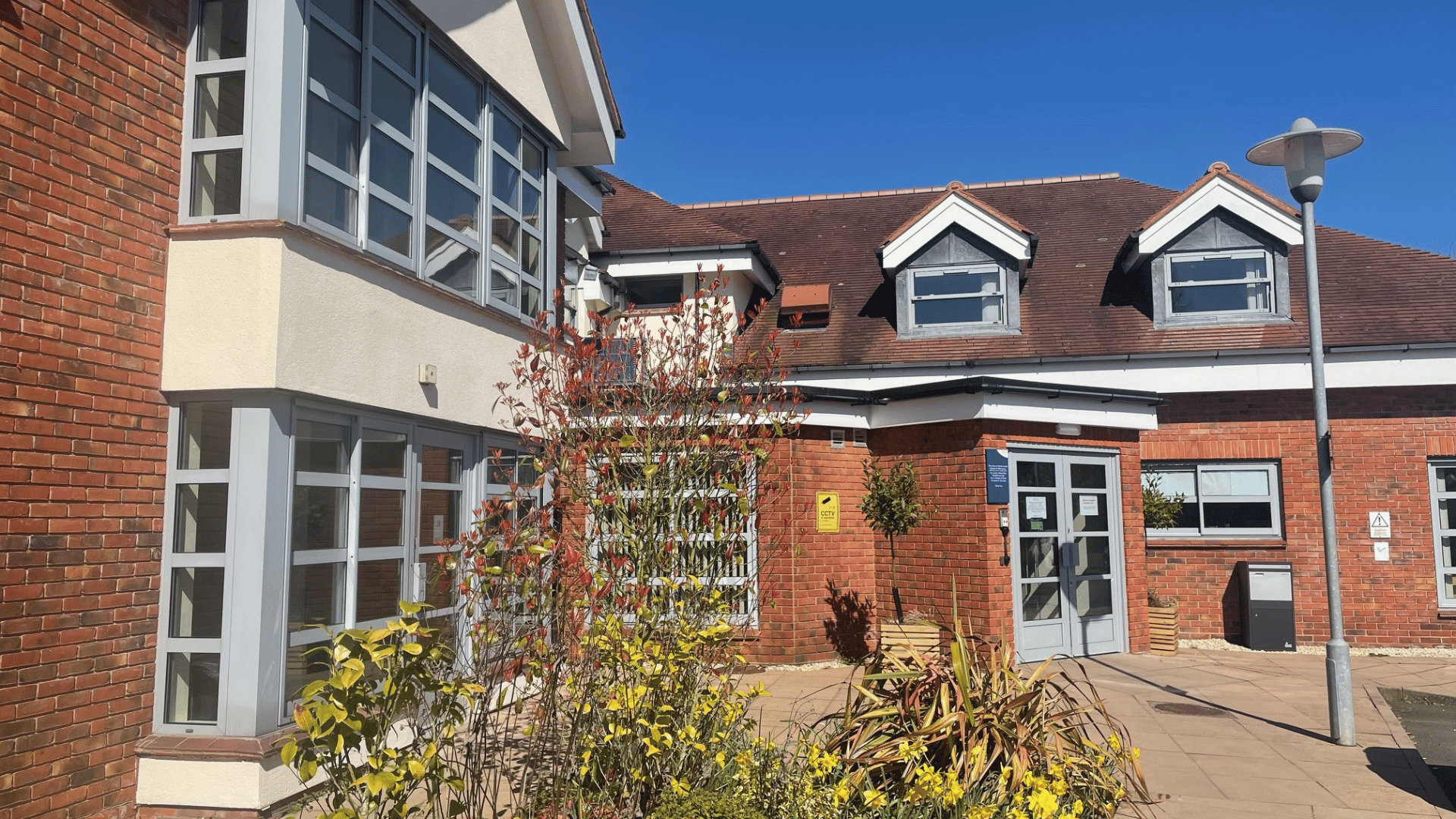About this location
Located in Meriden, Warwickshire, Priory Hospital Solihull is a 31-bedded hospital supporting the NHS by offering level 2 rehabilitation services for males.
Services at a glance
Click here to enable this content
Services
We provide support for adults with complex mental health needs and we consider referrals from all over the UK (although most of our referrals come from local Trusts within the West Midlands).
Most of our referrals are received from acute mental health wards, psychiatric intensive care units (PICUs), community mental health teams, and secure services.
We ensure that our patients are given the highest quality care, to promote their recovery and enable transition back home or into community services, wherever possible.
Ward break down
- Arley Ward – 10-bedded high dependency ward for adult males
- Elkin Ward – 10-bedded high dependency ward for adult males
- Millison Ward – 11-bedded community rehabilitation unit for adult males
When a referral is received, our team aims to complete a face-to-face pre-admission assessment within five working days. People are usually assessed by at least two professionals and we identify goals for admission immediately. We also consider which of the three wards will be best suited to meet individual needs.
Conditions treated
We are able to support people with:
- Severe and enduring mental health needs
- Schizophrenia
- Schizoaffective disorder
- Bipolar disorder
- Psychosis
- Depression
- Anxiety
- Personality disorders
- Neurodevelopmental disorders, including autism, attention deficit hyperactivity disorder (ADHD) and a mild learning disability
Treatment approaches
Priory Hospital Solihull offers an individualised, person-centred approach to all of our patients. In collaboration with patients and families, our ultimate aim is to support people to better understand their needs and goals, and to develop confidence and independence, in managing their health and wellbeing. We also support people to:
- Gain better control of symptoms
- Develop a range of coping skills to manage overwhelming feelings
- Develop meaningful occupation/vocations, including attending college courses
- Reduce the likelihood of relapse and subsequent admissions into hospital in the future
- Reintegrate and transition back into the community, with the development of pro-social networks. This includes onsite therapy sessions alongside family members, as well as support to access recreational and leisure activities through our local services
The ethos of the hospital is one of positive risk taking and an acceptance that ‘practice makes perfect’. This allows people to try out their new skills in a non-judgemental environment and learn to adapt when things don’t go according to plan.
We maintain close links with families, community teams and commissioners, involving them in the recovery journeys of those that we care for.
Our therapy programme uses a range of evidence-based assessments and interventions in both one-to-one and group settings. We evaluate our programme every eight weeks to ensure we are responding to the changing needs of the people we care. Lack of motivation and insight are specifically identified as a focus for therapy rather than a barrier to it.
Our programme includes:
- Practical skills such as road safety, kitchen safety and budgeting
- Supported grocery shopping for our self-catering population
- Cognitive behavioural therapy (CBT)
- Cognitive analytical therapy (CAT)
- Acceptance commitment informed Therapy (ACT)
- Compassion focused informed therapy (CFT)
- Dialectical behavioural informed Therapy (DBT)
- Motivational interviewing (MI)
- Trauma-focused interventions, including, eye movement desensitisation and reprocessing (EMDR) and stabilisation
- Positive behaviour support (PBS)
- Therapy groups include: addictions, anxiety, stress and anger management, developing life skills, developing insights, hearing voices, mindfulness, introduction to senses, interpersonal communication, processing grief and loss, relapse prevention, self-esteem and understanding emotions
- Bi-weekly exercise sessions provided by a fitness instructor
- In-reach groups from narcotics anonymous (NA), with transition to attending NA meetings hosted in the community
- Monthly visits from pets as therapy volunteers
- External vocational opportunities (college, volunteer work and paid employment)
- Real work opportunities (paid employment within the service) including gardening, barista work in our onsite coffee shop, litter picking, expert by lived experience
We are also able to offer additional assessments to support onward care planning, including:
- ASD assessment (ADOS-2 and ADI-R)
- ADHD assessment (CAARS & DIVA 5)
- Cognitive assessment (WAIS-IV)
- Test of premorbid functioning (TOPF)
- The Minnesota Multiphasic Personality Inventory (MMPI)
- Trauma assessment (TSI-2)
- Sensory profile
Outcome measures
We use a variety of outcome measures, which give us a balance of patient and clinician views. These tools are repeated at regular intervals to demonstrate progress that has been made.
Our team
We have a full SMT, MDT, and support services team, which consist of:
- Hospital director
- Director of clinical services
- Head of facilities
- Medical director
- Ward managers / deputy
- Senior / staff nurses
- Healthcare assistants
- Consultant psychiatrists
- Junior doctor
- Consultant clinical psychologist
- Assistant psychologist and trainee psychologists
- Occupational therapist
- Occupational therapy assistants
- Fitness instructor
- General advocacy and independent mental health advocate (IMHA) services
- Local GP services
- Access to a dietician
- Catering team
- Housekeeping team
- Maintenance team
- Administrators
We also provide specialist staff training, including:
- PBS training
- The National Autistic Society training
- Bi-weekly local educational sessions
- Weekly complex case discussions
- Monthly reflective practice sessions
- Monthly clinical supervision
Our facilities and environment
We believe that the environment in which treatment takes place is just as important as the treatment itself, when it comes to supporting our patients. Our large grounds provide a safe, empowering and validating space for people to recover from their mental health difficulties. On the wards, we provide:
Our garden offers patio furniture and a ball game areas and outdoor area provides a bbq and a football pitch. Millison Ward also has a full self-catering kitchen. In our therapy block, we provide:
Our bedrooms
All of our bedrooms are single occupancy and have en-suite bathrooms. Patients are encouraged to personalise their bedrooms while they are staying with us and they are able to use TVs and games consoles in their rooms if they wish. We provide:
Exclusion profile
• People under the age of 18
• People with a primary diagnosis of a learning disability
• People with a primary diagnosis of substance misuse
Pathways
Priory’s network of high quality facilities enables us to offer joined-up care pathways with our dedicated residential and supported living services in Priory Adult Care. We offer programmes which integrate healthcare treatment and therapy, which are tailored according to individual needs, in an appropriate setting.
Our strength is that we can provide a seamless transition for the individual as they progress between higher and lower dependency services.
We provide a step-down service to people who no longer require admission to acute wards or psychiatric intensive care units (PICUs), but are unable to be discharged into the community for a variety of reasons. This might include:
- Lack of access to suitable discharge placement
- Further assessment being required before discharge placement is identified
- A small amount of additional intervention is required but a long-term rehabilitation admission is not required
- The patient is waiting for a specialist rehabilitation admission
- The patient is waiting for allocation of additional professionals
This service is delivered within our R&R wards and aims to provide inpatient care closer to home, within a therapeutic and enabling environment, whilst freeing up acute beds for those who need them most.
Ward break down
- Arley Ward – 10-bedded high dependency ward for adult males
- Elkin Ward – 10-bedded high dependency ward for adult males
- Millison Ward – 11-bedded community rehabilitation unit for adult males
When a referral is received, our team aims to complete a face-to-face pre-admission assessment within five working days. People are usually assessed by at least two professionals and we identify goals for admission immediately. We also consider which of the three wards will be best suited to meet individual needs.
Conditions treated
We are able to support people with:
- Severe and enduring mental health needs
- Schizophrenia
- Schizoaffective disorder
- Bipolar disorder
- Psychosis
- Depression
- Anxiety
- Personality disorders
- Neurodevelopmental disorders, including autism, attention deficit hyperactivity disorder (ADHD) and a mild learning disability
Treatment approaches
Priory Hospital Solihull offers an individualised, person-centred approach to all of our patients. In collaboration with patients and families, our ultimate aim is to support people to better understand their needs and goals, and to develop confidence and independence, in managing their health and wellbeing.
The purpose of an admission to our community reablement service is to support people to resolve the barriers to discharge within the least restrictive setting.
The ethos of the hospital is one of positive risk taking and an acceptance that ‘practice makes perfect’. This allows people to try out their new skills in a non-judgemental environment and learn to adapt when things don’t go according to plan.
We maintain close links with families, community teams and commissioners, involving them in the recovery journeys of those that we care for.
Our therapy programme uses a range of evidence-based assessments and interventions in both one-to-one and group settings. We evaluate our programme every eight weeks to ensure we are responding to the changing needs of the people we care. Lack of motivation and insight are specifically identified as a focus for therapy rather than a barrier to it.
Our community reablement patients have access to our full therapy programme if required, however length of stay is considerably shorter as their stay is focussed on resolving barriers to admission rather than because patients need intensive intervention.
We are able to offer additional assessments to those on the community reablement programme, to support onward care planning. This can include:
- ASD assessment (ADOS-2 and ADI-R)
- ADHD assessment (CAARS & DIVA 5)
- Cognitive assessment (WAIS-IV)
- Test of premorbid functioning (TOPF)
- The Minnesota Multiphasic Personality Inventory (MMPI) • Trauma assessment (TSI-2)
- Sensory profile
Outcome measures
We use a variety of outcome measures, which give us a balance of patient and clinician views. These tools are repeated at regular intervals to demonstrate progress that has been made.
Our team
We have a full SMT, MDT, and support services team, which consist of:
- Hospital director
- Director of clinical services
- Head of facilities
- Medical director
- Ward managers / deputy
- Senior / staff nurses
- Healthcare assistants
- Consultant psychiatrists
- Junior doctor
- Consultant clinical psychologist
- Assistant psychologist and trainee psychologists
- Occupational therapist
- Occupational therapy assistants
- Fitness instructor
- General advocacy and independent mental health advocate (IMHA) services
- Local GP services
- Access to a dietician
- Catering team
- Housekeeping team
- Maintenance team
- Administrators
We also provide specialist staff training, including:
- PBS training
- The National Autistic Society training
- Bi-weekly local educational sessions
- Weekly complex case discussions
- Monthly reflective practice sessions
- Monthly clinical supervision
Our facilities and environment
We believe that the environment in which treatment takes place is just as important as the treatment itself, when it comes to supporting our patients. Our large grounds provide a safe, empowering and validating space for people to recover from their mental health difficulties. On the wards, we provide:
Our garden offers patio furniture and a ball game areas and outdoor area provides a bbq and a football pitch. Millison Ward also has a full self-catering kitchen. In our therapy block, we provide:
Our bedrooms
All of our bedrooms are single occupancy and have en-suite bathrooms. Patients are encouraged to personalise their bedrooms while they are staying with us and they are able to use TVs and games consoles in their rooms if they wish. We provide:
Exclusion profile
• People under the age of 18
• People with a primary diagnosis of a learning disability
• People with a primary diagnosis of substance misuse
Pathways
Priory’s network of high quality facilities enables us to offer joined-up care pathways with our dedicated residential and supported living services in Priory Adult Care. We offer programmes which integrate healthcare treatment and therapy, which are tailored according to individual needs, in an appropriate setting.
Our strength is that we can provide a seamless transition for the individual as they progress between higher and lower dependency services.
A message from our site leader

At Priory Hospital Solihull, our focus is to promote recovery in a way that is meaningful for each individual that we work with. We are passionate about working in collaboration with our patients and their families. Our ultimate aim is to improve patients’ understanding of their needs and develop confidence in independently managing their own health and wellbeing.
Priory Hospital Solihull site leader - Aimee McCooey
Information for family and friends
How do home visits work?
We encourage all of the people staying with us to maintain regular contact with friends and family. Patients are able to utilise leave home or to visit family/friends if the MDT has agreed this leave in advance.
What is your visitation policy?
We don't have any restrictions on visits however, we ask that visits are arranged in advance so that protected mealtimes, medication times and therapy sessions are avoided. Visitors are unfortunately unable to stay overnight, however there are nearby hotels available if required. Family and friends are welcome to eat with patients at a subsidised rate if arranged in advance, and hot drinks are always available during visits.
Will I be involved and kept up to date with my loved one’s care and wellbeing?
Yes, we encourage all patients to use their own mobile phones. However, there are times when this may be restricted, due to risk. Our hospital has incoming phone lines, and there are cordless phones on all wards which can be used at any time. In addition, we can support patients to purchase their own mobile phone if they don’t have one already.
Will my loved one be able to have a phone or call me?
Yes, we encourage all people staying with us to use their own mobile phones. However, there are times when this may be limited, due to risk factors. Our hospital has incoming phone lines, and there are cordless phones on all wards which can be used at any time. In addition, we can support patients to get their own mobile phone if they don’t have one already.
What type of things are families expected to provide, and what is provided by the home?
People will need to provide their own clothing and toiletries. On admission, everyone will receive a welcome pack with some essentials.
What are the bedrooms like?
Every bedroom has a bed, bedding and basic furniture, such as a chest of drawers, wardrobe, bedside table and chair. Each bedroom has an en-suite bathroom, with a shower, toilet and wash basin. Our rooms can be personalised with people’s own furniture and decorations, where appropriate.
Are external doors kept locked?
All of our external doors are locked for general site security. Patients may have escorted or unescorted leave within the hospital grounds or out into the community, depending on their needs. Patients may request to leave the ward to utilise leave and staff will sign them out if they have the correct leave in place and are risk assessed as safe to go out. We have a large garden area which patients are free to use any time.
What do service users eat and how do meal times work?
Breakfast is self-service and lunch and evening meals are prepared fresh by the on site catering team. Snacks are also available at all times. Patients are supported to choose what they want to eat at mealtimes; there is always a choice available, as well as easy-read menus. Our team also seek guidance from patients, their family members and healthcare professionals to ensure that special dietary requirements are catered for. On Millison Ward, we encourage patients to self-cater as often as they are able to.
How does laundry work?
Arley Ward and Elkin Ward have a shared commercial grade laundry room that is accessible to patients. Millison Ward has a domestic laundry room on the ward. Patients are encouraged to do their own laundry however staff will support them if required.
Is there anything they can’t bring or have?
We would ask that people do not bring valuables such as family heirlooms to our hospital, as we cannot guarantee their safety. We may place restrictions on some items, where the risks cannot be appropriately managed, for example, scissors, medications and razors may be restricted if needed.
Are pets allowed?
Patients may be able to have pets, dependent on their individual needs and their ability to care for them, as agreed by the MDT. Pet visitors are also very welcome.
How do activities work?
Every patient has a personalised timetable that includes recreational activities, one-to-one and group therapies. There are a variety of activities and therapies available, and these are developed with input from patients and the MDT. These include on-site activities as well as visits into the community.
Do service users and families have an input into the service user’s care plans?
We fully encourage patients and their families to be involved in the assessment and care planning process as well as our monthly MDT meetings which is a meeting between our patients and their clinical team. Care plans are reviewed monthly and patients and their family members are invited to contribute. We always welcome family feedback on progress and family can contact the team at any time.
What are the car parking facilities?
We have a large carpark on-site, which is free to use.
What is the smoking policy? Can service users buy cigarettes?
Priory Hospital Solihull is a smoke free site. Patients, staff and visitors are required to leave the hospital grounds if they wish to smoke. We do permit vaping in bedrooms and within the ward courtyards and hospital grounds. While we can support patients to purchase cigarette and vapes at the local shop, we also have a full smoking cessation programme available, including nicotine replacement therapy (NRT).
How is treatment accessed and funded?
We don’t take referrals directly from individuals and families. Referrals are received from referring organisations, namely the NHS. Once a referral is received, our clinical team will arrange a face to face assessment as soon as possible. If accepted for our service, the funding authority (NHS) will need to approve funding prior to a handover meeting and admission being arranged.
How to make a referral
Our customer service centre provides 24/7 support for NHS mental health enquiries and referrals. Our customer referral co-ordinators can support you from your first call right through to the enquiry conclusion, providing updates throughout the process. We offer 24/7 crisis referrals, fast access to bed availability and placements, and a single access point for end-to-end enquiry management.












